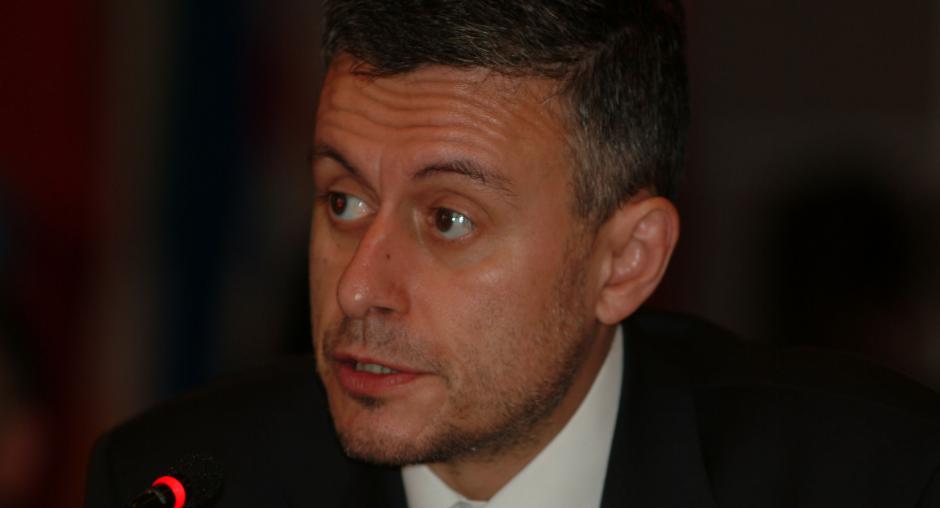Newsroom
OSCE Chairman calls for focus on new areas in fight against terrorism
VIENNA 23 June 2004

(OSCE/Alex Nitzsche)The OSCE Chairman-in-Office, Bulgarian Foreign Minister Solomon Passy, at the opening of the Annual Security Review Conference, 23 June 2004. (OSCE/Alex Nitzsche) Photo details
VIENNA, 23 June 2004 - The OSCE Chairman-in-Office, Bulgarian Foreign Minister Solomon Passy, called on Wednesday on the Organization's 55 participating States to focus on new areas such as chemical, biological, radiological and nuclear materials in the fight against global terrorism.
Opening the OSCE Annual Security Review Conference in Vienna, he said the Organization continued to concentrate successfully on practical areas such as making aircraft and airports safer from the threat of shoulder-fired missiles or making passports harder to forge.
"But us let challenge ourselves even further by admitting that putting into practice our current commitments might not be enough," the Chairman-in-Office said.
"In view of recent research indicating the increased risk of asymmetric and non-conventional threats, we should devote more attention to the danger posed by chemical, biological, radiological and nuclear materials."
Bulgaria, for example, had agreed to close two nuclear reactors before it joins the European Union in 2007. But this meant it now had to find alternative work for several thousand skilled and highly trained scientists.
"Other countries will face similar problems. It is important that there is a concerted response to this problem from the international community to make sure that scientists are not tempted to take work in countries which do not have the same respect for the international conventions controlling such sensitive materials," the Chairman-in-Office said.
Wednesday's opening session of the two-day conference was also addressed by the EU Coordinator on Counter-Terrorism, Gijs de Vries, and the Deputy Secretary of the U.S. Department of Homeland Security, Admiral James Loy.
Minister Passy said OSCE countries also needed to improve their efforts to make it harder for terrorists to obtain conventional explosives, which remain the basic weapon of terrorist attacks.
"We need to do more to improve security at civilian sites storing conventional explosives and to eliminate the risks from stockpiles," he said.
"Other areas we need to build on include the security of containers, in which around 90 percent of the world's goods are shipped, protecting our energy infrastructure from possible attack and countering the use of the Internet by terrorists as a tool for communications and propaganda."
The Chairman-in-Office said the OSCE had also built up a unique expertise in police training which was so much in demand from participating States that it could barely keep up with requests for assistance.
"There is a clear link between terrorism and general crime and lawlessness. Helping all 55 OSCE countries to build up modern, effective police forces - which are democratically accountable to the people they serve - represents a major contribution to the fight against terrorism which will pay dividends in the long term," he said.
Opening the OSCE Annual Security Review Conference in Vienna, he said the Organization continued to concentrate successfully on practical areas such as making aircraft and airports safer from the threat of shoulder-fired missiles or making passports harder to forge.
"But us let challenge ourselves even further by admitting that putting into practice our current commitments might not be enough," the Chairman-in-Office said.
"In view of recent research indicating the increased risk of asymmetric and non-conventional threats, we should devote more attention to the danger posed by chemical, biological, radiological and nuclear materials."
Bulgaria, for example, had agreed to close two nuclear reactors before it joins the European Union in 2007. But this meant it now had to find alternative work for several thousand skilled and highly trained scientists.
"Other countries will face similar problems. It is important that there is a concerted response to this problem from the international community to make sure that scientists are not tempted to take work in countries which do not have the same respect for the international conventions controlling such sensitive materials," the Chairman-in-Office said.
Wednesday's opening session of the two-day conference was also addressed by the EU Coordinator on Counter-Terrorism, Gijs de Vries, and the Deputy Secretary of the U.S. Department of Homeland Security, Admiral James Loy.
Minister Passy said OSCE countries also needed to improve their efforts to make it harder for terrorists to obtain conventional explosives, which remain the basic weapon of terrorist attacks.
"We need to do more to improve security at civilian sites storing conventional explosives and to eliminate the risks from stockpiles," he said.
"Other areas we need to build on include the security of containers, in which around 90 percent of the world's goods are shipped, protecting our energy infrastructure from possible attack and countering the use of the Internet by terrorists as a tool for communications and propaganda."
The Chairman-in-Office said the OSCE had also built up a unique expertise in police training which was so much in demand from participating States that it could barely keep up with requests for assistance.
"There is a clear link between terrorism and general crime and lawlessness. Helping all 55 OSCE countries to build up modern, effective police forces - which are democratically accountable to the people they serve - represents a major contribution to the fight against terrorism which will pay dividends in the long term," he said.
